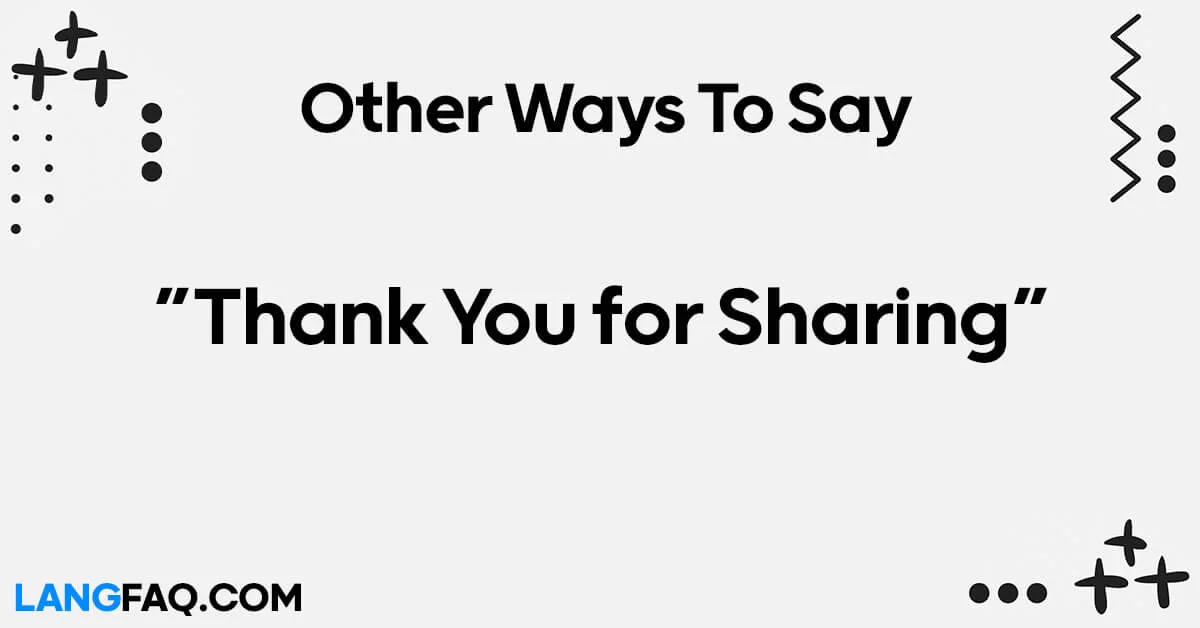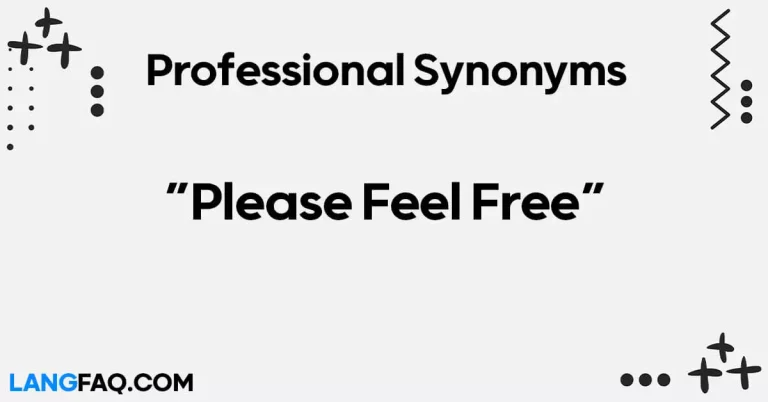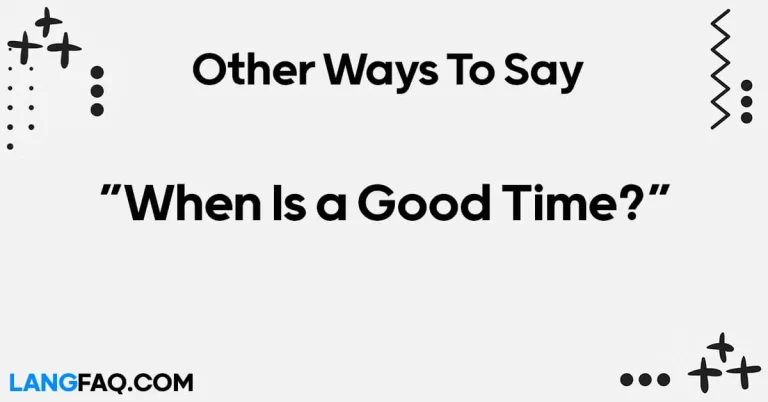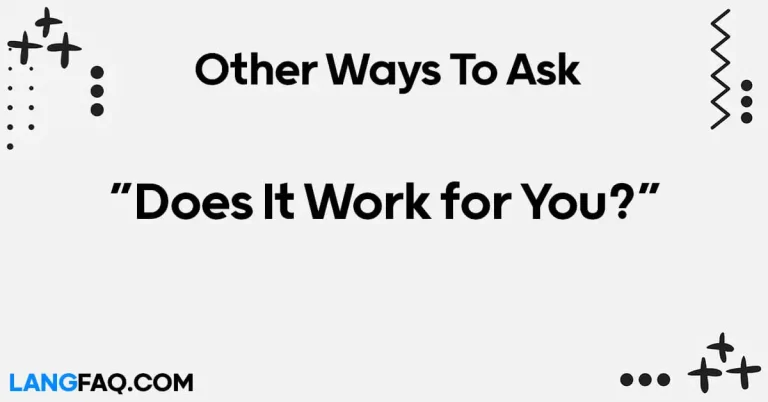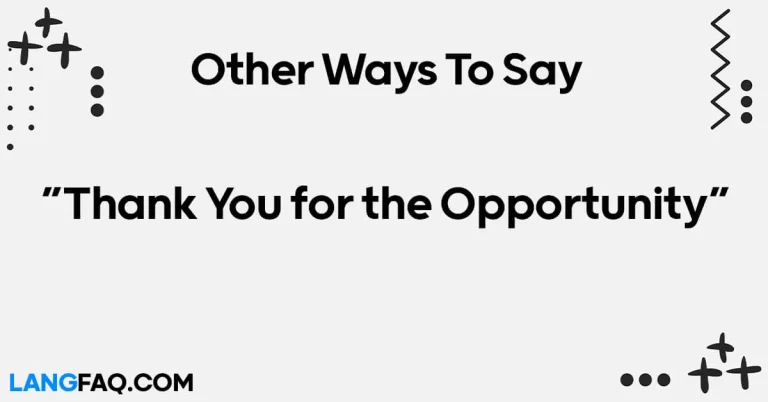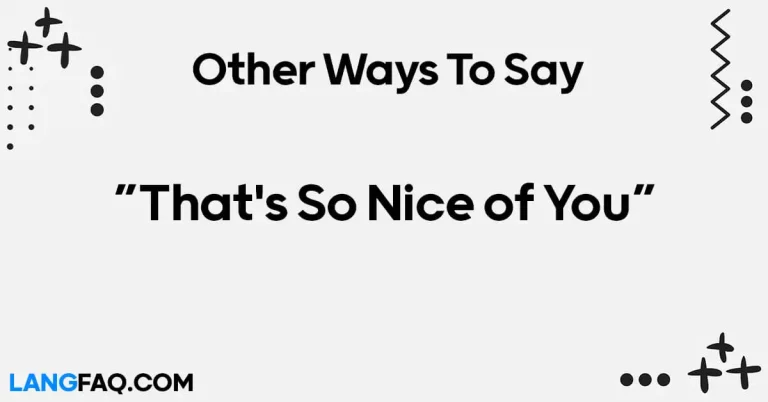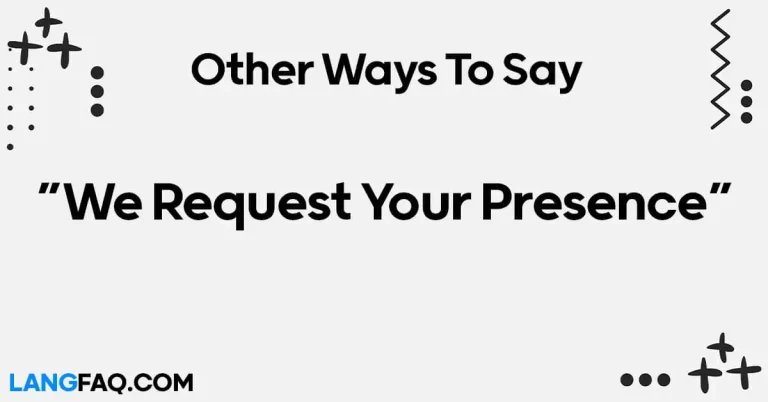Expressing gratitude is a powerful way to strengthen relationships, foster goodwill, and spread positivity. When someone shares something with us, whether it’s knowledge, a moment, or an experience, it’s important to acknowledge their gesture sincerely. While “thank you” is a timeless phrase, expanding your vocabulary with alternatives can add depth and sincerity to your expressions of gratitude. In this article, we’ll explore 12 other ways to say “thank you for sharing,” offering you a diverse range of phrases and gestures to convey appreciation effectively.
12 Other Ways to Say “Thank You for Sharing”
Here are 12 other ways to say “Thank You for Sharing”:
- Thank you kindly for passing that along.
- I appreciate you sharing that with me.
- Thanks a bunch for sharing!
- I’m grateful for your willingness to share.
- Much obliged for passing on that information.
- Thank you for including me in the conversation.
- I’m thankful for your openness in sharing.
- Thanks a million for sharing your insights.
- I’m so grateful you shared that with me.
- Thank you for your generosity in sharing.
- I truly appreciate you sharing your thoughts.
- Many thanks for sharing your knowledge with me.
| Expression | Meaning | Example |
|---|---|---|
| Thank you kindly | Expressing gratitude politely | “Thank you kindly for passing that along.” |
| I appreciate you | Showing appreciation for someone’s gesture | “I appreciate you sharing that with me.” |
| Thanks a bunch | Informal way to say thank you | “Thanks a bunch for sharing!” |
| Much obliged | Feeling grateful for someone’s action | “Much obliged for passing on that information.” |
| Thank you for including me | Thanking someone for including you | “Thank you for including me in the conversation.” |
| I’m thankful | Expressing gratitude | “I’m thankful for your openness in sharing.” |
| Thanks a million | Informal way to express gratitude | “Thanks a million for sharing your insights.” |
| I’m so grateful | Showing deep appreciation | “I’m so grateful you shared that with me.” |
| Many thanks | Another way to say thank you | “Many thanks for sharing your knowledge with me.” |
| Thanks a ton | Informal way to thank someone | “Thanks a ton for sharing your thoughts.” |
These diverse expressions of gratitude offer various ways to convey appreciation for someone’s willingness to share. Whether formal or informal, each phrase communicates heartfelt thanks, enriching interpersonal connections and fostering a culture of appreciation.
Is It Correct to Say “Thank You for Sharing”?
Yes, “Thank you for sharing” is a correct and polite way to express gratitude when someone has shared something with you, whether it’s information, a story, an experience, or something else. This phrase acknowledges the act of sharing and shows appreciation for the gesture. It’s commonly used in various contexts, such as in conversations, meetings, social media interactions, and more.
Professional Mail Example With “Thank You for Sharing”
Subject: Appreciation for Your Insightful Contribution
Dear [Recipient’s Name],
I hope this email finds you well. I wanted to take a moment to express my sincere gratitude for your recent contribution during [specific event or meeting]. Your insights and expertise were truly invaluable, and I wanted to extend my heartfelt thanks for sharing them with us.
Thank you for sharing your knowledge and perspective. Your input has greatly enriched our discussions and contributed to our collective understanding of [topic or subject].
I look forward to the opportunity to collaborate with you further in the future. Please feel free to reach out if there’s anything I can assist you with.
Once again, thank you for sharing your expertise.
Warm regards, [Your Name]
Thank You Kindly
Expressing gratitude politely is essential in various situations, whether you’re thanking a colleague for sharing valuable information or expressing appreciation to a friend for their thoughtfulness. “Thank you kindly” is a versatile phrase that conveys appreciation graciously.
Usage and Scenarios
- Formal Context: Use “thank you kindly” in professional settings, such as business meetings or email correspondences, to convey gratitude in a polite and respectful manner.
- Informal Context: Employ this phrase in casual conversations with friends or acquaintances to express appreciation for their gestures or favors.
Example Sentence
- Formal Context: “Thank you kindly for forwarding the report to me. Your assistance is greatly appreciated.”
- Informal Context: “Thank you kindly for inviting me to your party. I’m looking forward to it!”
Email Sample
Subject: Appreciation for Your Assistance
Dear [Recipient’s Name],
I hope this email finds you well. I wanted to extend my sincere gratitude for your assistance with [specific task or favor]. Your support has been invaluable, and I truly appreciate your willingness to [describe their action].
Thank you kindly for your help. Please let me know if there’s anything I can assist you with in return.
Warm regards, [Your Name]
Variations
- Colleague Relationship: “Thank you kindly for your collaboration on this project.”
- Friendship: “Thank you kindly for always being there for me.”
Dictionary Insight
According to the Cambridge Dictionary, “thank you kindly” is an idiom used to express gratitude in a polite and appreciative manner.
Tips
- Use “thank you kindly” in situations where you want to convey appreciation with a touch of formality.
- Follow up with a specific detail about the favor or gesture to personalize your gratitude.
Pros and Cons
- Pros: Polite and respectful, suitable for both formal and informal contexts.
- Cons: May sound overly formal in very casual settings.
In conclusion, “thank you kindly” is a versatile phrase that adds a touch of politeness and appreciation to your expressions of gratitude, making it suitable for various situations and relationships.
I Appreciate You
Showing appreciation is a fundamental aspect of building and maintaining relationships, whether personal or professional. “I appreciate you” is a heartfelt phrase that conveys gratitude sincerely.
Usage and Scenarios
- Formal Context: Use “I appreciate you” in professional settings to express gratitude to colleagues or clients for their contributions or support.
- Informal Context: Employ this phrase in personal relationships to express heartfelt thanks to friends or family members for their kindness or support.
Example Sentence
- Formal Context: “I appreciate you taking the time to meet with me today. Your insights were incredibly valuable.”
- Informal Context: “I appreciate you being there for me during difficult times. Your support means the world to me.”
Email Sample
Subject: Gratitude for Your Support
Dear [Recipient’s Name],
I wanted to take a moment to express my sincere gratitude for your unwavering support throughout [specific situation or period]. Your kindness and encouragement have been a source of strength for me, and I deeply appreciate you being there for me.
I appreciate you more than words can express. Thank you for everything.
Warm regards, [Your Name]
Variations
- Colleague Relationship: “I appreciate you going above and beyond to meet the deadline.”
- Friendship: “I appreciate you always being a reliable friend.”
Dictionary Insight
According to Merriam-Webster, “appreciate” means to value or admire something or someone. When used in the context of gratitude, it signifies acknowledging the value of someone’s actions or presence.
Tips
- Use “I appreciate you” when you want to convey heartfelt gratitude and admiration.
- Follow up with specific examples of their actions to demonstrate the impact of their support.
Pros and Cons
- Pros: Conveys genuine appreciation and admiration, suitable for various relationships.
- Cons: May sound overly formal in very casual settings.
Thanks a Bunch
In informal settings, expressing gratitude doesn’t always have to be formal. “Thanks a bunch” is a casual yet warm way to convey appreciation, perfect for friends, family, or colleagues in relaxed environments.
Usage and Scenarios
- Informal Context: Use “thanks a bunch” in casual conversations with friends, family members, or colleagues to express gratitude for small favors, gestures, or acts of kindness.
- Colloquial Settings: Employ this phrase in everyday interactions to convey appreciation in a friendly and light-hearted manner.
Example Sentence
- Informal Context: “Thanks a bunch for grabbing me a coffee on your way in. You’re a lifesaver!”
- Colloquial Setting: “Thanks a bunch for helping me with the presentation. You’re the best!”
Email Sample
Subject: Big Thanks!
Hey [Recipient’s Name],
Just wanted to shoot you a quick email to say thanks a bunch for [specific action or favor]. Your help made a huge difference, and I really appreciate it!
Catch you later, [Your Name]
Variations
- Friendship: “Thanks a bunch for always having my back.”
- Colleague Relationship: “Thanks a bunch for covering for me while I was out sick.”
Dictionary Insight
According to Oxford Languages, “thanks a bunch” is an informal expression of gratitude, often used to thank someone in a casual or friendly manner.
Tips
- Use “thanks a bunch” in situations where a more casual tone is appropriate, such as among friends or colleagues with whom you have a close relationship.
- Pair it with a smile or a friendly gesture to enhance its warmth and sincerity.
Pros and Cons
- Pros: Casual and friendly, suitable for informal settings and relationships.
- Cons: May be perceived as too informal in very formal contexts.
In conclusion, “thanks a bunch” is a laid-back yet heartfelt way to express appreciation, perfect for informal interactions where a casual tone is preferred.
Much Obliged
When you want to express gratitude with a touch of old-world charm, “much obliged” is the phrase to use. This slightly formal expression adds a touch of elegance to your appreciation.
Usage and Scenarios
- Formal Context: Use “much obliged” in professional settings, such as business meetings or correspondence, to convey gratitude with sophistication.
- Polite Acknowledgment: Employ this phrase when thanking someone for a favor, gesture, or assistance in a courteous and refined manner.
Example Sentence
- Formal Context: “I’m much obliged for your assistance with the project. Your expertise has been invaluable.”
- Polite Acknowledgment: “Much obliged for holding the door open. Thank you!”
Email Sample
Subject: Sincere Thanks
Dear [Recipient’s Name],
I wanted to extend my heartfelt thanks for [specific action or favor]. Your assistance has been instrumental, and I am truly much obliged for your support.
Warm regards, [Your Name]
Variations
- Professional Setting: “I’m much obliged for your guidance throughout this process.”
- Everyday Politeness: “Much obliged for helping me carry these groceries.”
Dictionary Insight
According to Collins Dictionary, “much obliged” is an idiomatic expression used to indicate gratitude or indebtedness to someone for their help or support.
Tips
- Use “much obliged” in situations where you want to convey gratitude with a touch of formality and sophistication.
- Pair it with a sincere smile and eye contact to enhance its impact.
Pros and Cons
- Pros: Adds elegance and refinement to your expressions of gratitude, suitable for formal settings.
- Cons: May sound overly formal or outdated in very casual contexts.
Thank You for Including Me
Feeling included and valued in social interactions is important for building strong relationships. When someone extends an invitation or includes you in an activity, expressing gratitude is essential. “Thank you for including me” acknowledges their gesture and reinforces the sense of belonging.
Usage and Scenarios
- Social Settings: Use this phrase when someone invites you to an event, gathering, or activity, expressing appreciation for their inclusivity.
- Workplace: Employ this expression when colleagues involve you in meetings, projects, or social events, conveying gratitude for their recognition and inclusion.
Example Sentence
- Social Settings: “Thank you for including me in your dinner plans. I’m looking forward to spending time together.”
- Workplace: “I wanted to say thank you for including me in the brainstorming session. I appreciate being part of the team.”
Email Sample
Subject: Grateful for the Invitation
Hi [Host’s Name],
I just wanted to drop you a quick note to say thank you for including me in [event/activity]. It means a lot to me to be part of the celebration. I’m looking forward to it!
Best regards, [Your Name]
Variations
- Formal Setting: “Thank you for including me in the interview panel.”
- Informal Setting: “Thanks for including me in your weekend plans.”
Dictionary Insight
According to Lexico, “thank you for including me” is an expression used to show appreciation for being invited or involved in a particular activity or event.
Tips
- Use this phrase to express gratitude when someone includes you in their plans, whether it’s a social gathering or a professional engagement.
- Follow up with a specific detail about the event or activity to personalize your gratitude.
Pros and Cons
- Pros: Reinforces a sense of belonging and appreciation for inclusion.
- Cons: May sound too formal for very casual interactions.
In conclusion, “thank you for including me” is a simple yet powerful way to express gratitude for being included in social or professional activities, fostering a sense of connection and belonging.
I’m Thankful
When you want to express gratitude sincerely and directly, “I’m thankful” is a straightforward phrase to use. It conveys heartfelt appreciation and gratitude for someone’s actions, words, or presence.
Usage and Scenarios
- Personal Relationships: Use “I’m thankful” to express gratitude to friends, family members, or romantic partners for their support, love, or kindness.
- Professional Settings: Employ this phrase in the workplace to express appreciation to colleagues, supervisors, or clients for their assistance, guidance, or contributions.
Example Sentence
- Personal Relationships: “I’m thankful for your unwavering support during difficult times. You’re always there for me.”
- Professional Settings: “I wanted to express how thankful I am for your mentorship. Your guidance has been invaluable to my professional growth.”
Email Sample
Subject: Gratitude for Your Support
Dear [Recipient’s Name],
I just wanted to take a moment to express how thankful I am for [specific action, support, or gesture]. Your kindness and support mean the world to me, and I wanted to let you know how much I appreciate it.
With gratitude, [Your Name]
Variations
- Family: “I’m thankful for having you as my sibling. You always know how to make me smile.”
- Workplace: “I’m thankful for the opportunity to work with such talented colleagues.”
Dictionary Insight
According to Merriam-Webster, “thankful” means feeling or expressing gratitude or appreciation. When used in expressions of gratitude, it conveys sincere appreciation for someone’s actions, words, or presence.
Tips
- Use “I’m thankful” when you want to express sincere and heartfelt gratitude directly to someone.
- Follow up with specific examples of their actions or qualities to personalize your appreciation.
Pros and Cons
- Pros: Direct and sincere, suitable for expressing deep gratitude and appreciation.
- Cons: May sound too formal for very casual interactions.
Thanks a Million
In moments when “thank you” doesn’t feel like enough, “thanks a million” steps in to express immense gratitude and appreciation. This informal phrase adds a touch of warmth and enthusiasm to your expressions of thanks.
Usage and Scenarios
- Informal Settings: Use “thanks a million” in casual conversations with friends, family, or colleagues to convey heartfelt gratitude for significant favors, gestures, or acts of kindness.
- Joyful Occasions: Employ this phrase during celebrations, milestones, or moments of shared happiness to express exuberant thanks and appreciation.
Example Sentence
- Informal Settings: “Thanks a million for helping me move last weekend. I couldn’t have done it without you!”
- Joyful Occasions: “Thanks a million for being part of our special day. Your presence meant everything to us.”
Email Sample
Subject: Grateful Beyond Words
Hey [Recipient’s Name],
I just wanted to drop you a quick note to say thanks a million for [specific action, favor, or support]. Your generosity and kindness haven’t gone unnoticed, and I’m truly grateful for everything you’ve done.
With heartfelt thanks, [Your Name]
Variations
- Friendship: “Thanks a million for always being there for me, no matter what.”
- Colleague Relationship: “Thanks a million for covering for me while I was on vacation.”
Dictionary Insight
According to Macmillan Dictionary, “thanks a million” is an informal expression used to thank someone very much for something they have done.
Tips
- Use “thanks a million” to express exuberant gratitude and appreciation for significant favors or gestures.
- Pair it with a smile or a warm gesture to enhance its impact and sincerity.
Pros and Cons
- Pros: Conveys heartfelt gratitude and enthusiasm, suitable for informal settings and joyful occasions.
- Cons: May be perceived as too informal in very formal contexts.
In conclusion, “thanks a million” is a lively and heartfelt way to express gratitude and appreciation, perfect for informal interactions where warmth and enthusiasm are welcomed.
I’m So Grateful
Expressing deep gratitude and appreciation requires words that reflect the depth of your feelings. “I’m so grateful” is a phrase that conveys heartfelt thanks and acknowledges the significance of someone’s actions or presence.
Usage and Scenarios
- Personal Relationships: Use “I’m so grateful” to express profound gratitude to friends, family members, or romantic partners for their unwavering support, love, or kindness.
- Professional Settings: Employ this phrase in the workplace to express sincere appreciation to colleagues, mentors, or clients for their guidance, assistance, or contributions.
Example Sentence
- Personal Relationships: “I’m so grateful for your love and support. You’re my rock, and I couldn’t imagine life without you.”
- Professional Settings: “I wanted to express how grateful I am for your mentorship. Your guidance has been invaluable to my growth and development.”
Email Sample
Subject: Heartfelt Thanks
Dear [Recipient’s Name],
I hope this email finds you well. I wanted to take a moment to express how grateful I am for [specific action, support, or gesture]. Your kindness and support have made a significant difference in my life, and I wanted to let you know how much I appreciate it.
With heartfelt thanks, [Your Name]
Variations
- Family: “I’m so grateful for having you as my parent. Your love and guidance have shaped who I am today.”
- Workplace: “I’m so grateful for the opportunity to work with such talented colleagues.”
Dictionary Insight
According to Lexico, “grateful” means feeling or showing an appreciation for kindness. When used in expressions of gratitude, it conveys sincere appreciation and acknowledgment of someone’s actions or presence.
Tips
- Use “I’m so grateful” when you want to express profound gratitude and appreciation for someone’s actions or presence.
- Follow up with specific examples or qualities to personalize your appreciation and convey the depth of your gratitude.
Pros and Cons
- Pros: Conveys deep gratitude and appreciation, suitable for expressing profound thanks in personal and professional contexts.
- Cons: May sound too formal for very casual interactions.
Many Thanks
In moments when a simple “thank you” feels insufficient, “many thanks” steps in to convey a heightened level of appreciation and gratitude. This phrase adds a touch of formality and sincerity to your expressions of thanks.
Usage and Scenarios
- Formal Settings: Use “many thanks” in professional environments, such as business meetings, email correspondences, or formal letters, to convey gratitude in a respectful and courteous manner.
- Appreciative Gestures: Employ this phrase to express gratitude for significant favors, gestures, or acts of kindness that warrant a more formal acknowledgment.
Example Sentence
- Formal Settings: “Many thanks for considering my proposal. Your support means a lot to me.”
- Appreciative Gestures: “Many thanks for your generous donation. Your contribution will make a significant impact.”
Email Sample
Subject: Appreciation for Your Assistance
Dear [Recipient’s Name],
I wanted to extend my heartfelt thanks to you for [specific action, support, or gesture]. Your kindness and generosity have been truly appreciated, and I wanted to express my gratitude formally.
Many thanks for your continued support.
Best regards, [Your Name]
Variations
- Professional Setting: “Many thanks for your prompt response to my inquiry.”
- Personal Relationship: “Many thanks for always being there for me when I needed you.”
Dictionary Insight
According to Merriam-Webster, “many thanks” is an idiomatic expression used to convey gratitude in a formal and respectful manner, particularly in written communication.
Tips
- Use “many thanks” in situations where a more formal tone is appropriate, such as professional interactions or formal acknowledgments.
- Follow up with specific details about the favor or gesture to personalize your gratitude and enhance its impact.
Pros and Cons
- Pros: Adds formality and sincerity to your expressions of gratitude, suitable for professional environments and formal acknowledgments.
- Cons: May sound overly formal in very casual settings.
In conclusion, “many thanks” is a formal yet sincere way to express gratitude and appreciation, perfect for professional environments and formal acknowledgments where respect and courtesy are valued.
Thanks a Ton
When you want to express gratitude with a touch of enthusiasm and informality, “thanks a ton” is the phrase to use. This colloquial expression adds warmth and appreciation to your expressions of thanks.
Usage and Scenarios
- Informal Settings: Use “thanks a ton” in casual conversations with friends, family, or colleagues to convey heartfelt gratitude for significant favors, gestures, or acts of kindness.
- Expressive Appreciation: Employ this phrase when you want to express enthusiastic thanks and appreciation in a friendly and light-hearted manner.
Example Sentence
- Informal Settings: “Thanks a ton for helping me move last weekend. I really appreciate it!”
- Expressive Appreciation: “Thanks a ton for being such an amazing friend. You always know how to brighten my day.”
Email Sample
Subject: Heartfelt Thanks
Hey [Recipient’s Name],
Just wanted to drop you a quick note to say thanks a ton for [specific action, favor, or support]. Your kindness and generosity haven’t gone unnoticed, and I’m truly grateful for everything you’ve done.
With heartfelt thanks, [Your Name]
Variations
- Friendship: “Thanks a ton for always having my back. You’re the best!”
- Colleague Relationship: “Thanks a ton for covering for me while I was out sick. I owe you one!”
Dictionary Insight
According to Oxford Languages, “thanks a ton” is an informal expression used to convey gratitude and appreciation in a friendly and enthusiastic manner.
Tips
- Use “thanks a ton” in situations where a more informal and enthusiastic tone is appropriate, such as casual interactions or expressing heartfelt appreciation.
- Pair it with a smile or a friendly gesture to enhance its warmth and sincerity.
Pros and Cons
- Pros: Conveys warmth and enthusiasm, suitable for informal settings and expressions of heartfelt appreciation.
- Cons: May be perceived as too informal in very formal contexts.
Thank You for Your Generosity
Expressing gratitude for someone’s generosity goes beyond a simple “thank you.” When someone extends their generosity, whether through a kind gesture, gift, or act of kindness, it’s important to convey heartfelt appreciation. “Thank you for your generosity” acknowledges their kindness and the impact it has had.
Usage and Scenarios
- Personal Relationships: Use this phrase to express gratitude to friends, family members, or acquaintances for their generosity, whether it’s a thoughtful gift, financial support, or emotional assistance.
- Charitable Contributions: Employ this expression to thank individuals or organizations for their generosity in donating time, resources, or funds to charitable causes.
Example Sentence
- Personal Relationships: “Thank you for your generosity in hosting us for dinner. We had a wonderful time.”
- Charitable Contributions: “Thank you for your generosity in supporting our community fundraiser. Your contribution will make a meaningful difference.”
Email Sample
Subject: Gratitude for Your Generosity
Dear [Recipient’s Name],
I wanted to take a moment to express my heartfelt gratitude for your generosity. Your [specific gesture, gift, or support] has touched my heart, and I am truly grateful for your kindness and thoughtfulness.
Thank you for your generosity. It means more than words can express.
Warm regards, [Your Name]
Variations
- Friendship: “Thank you for your generosity in always being there for me when I needed support.”
- Professional Setting: “Thank you for your generosity in sharing your expertise and guidance with me.”
Dictionary Insight
According to Lexico, “generosity” is the quality of being kind and generous. When used in expressions of gratitude, it signifies acknowledgment and appreciation for someone’s kindness and generosity.
Tips
- Use “thank you for your generosity” to express sincere appreciation for someone’s kindness and generosity.
- Follow up with specific details about their gesture or support to personalize your gratitude and convey its impact.
Pros and Cons
- Pros: Conveys heartfelt gratitude for someone’s kindness and generosity, suitable for personal and professional settings.
- Cons: May sound too formal for very casual interactions.
In conclusion, “thank you for your generosity” is a sincere and heartfelt way to express gratitude for someone’s kindness and generosity, perfect for acknowledging meaningful gestures and acts of kindness.
Heartfelt Appreciation
When someone’s actions or words have touched your heart, expressing heartfelt appreciation is essential. “Heartfelt appreciation” conveys sincere gratitude and acknowledges the depth of someone’s impact on your life or circumstances.
Usage and Scenarios
- Personal Relationships: Use this phrase to express deep gratitude to friends, family members, or loved ones for their unwavering support, love, or kindness during challenging times.
- Professional Settings: Employ this expression to thank colleagues, mentors, or clients for their guidance, assistance, or contributions that have made a significant difference in your professional growth or success.
Example Sentence
- Personal Relationships: “I wanted to express my heartfelt appreciation for your support during [specific challenging situation]. Your kindness meant the world to me.”
- Professional Settings: “I extend my heartfelt appreciation to you for your mentorship and guidance. Your support has been invaluable to my professional development.”
Email Sample
Subject: Heartfelt Appreciation
Dear [Recipient’s Name],
I hope this email finds you well. I wanted to take a moment to express my heartfelt appreciation for [specific action, support, or gesture]. Your kindness and support have made a profound difference in my life, and I am truly grateful for everything you’ve done.
With heartfelt appreciation, [Your Name]
Variations
- Family: “I want to express my heartfelt appreciation for always being there for me, no matter what.”
- Workplace: “I extend my heartfelt appreciation to you for your leadership and guidance during this challenging project.”
Dictionary Insight
According to Merriam-Webster, “heartfelt” means deeply or sincerely felt. When used in expressions of gratitude, it signifies genuine and profound appreciation for someone’s actions or words.
Tips
- Use “heartfelt appreciation” to express sincere and profound gratitude for someone’s impact on your life or circumstances.
- Follow up with specific examples or qualities to personalize your appreciation and convey the depth of your gratitude.
Pros and Cons
- Pros: Conveys genuine and profound gratitude for someone’s actions or words, suitable for personal and professional settings.
- Cons: May sound too formal for very casual interactions.
FAQs
What are some creative ways to say “thank you for sharing” without using the phrase itself? Expressing gratitude creatively can involve using heartfelt phrases like “I’m profoundly thankful for your generosity” or incorporating warm gestures such as offering a handwritten note or a warm hug.
How can I express genuine appreciation for someone’s contribution? To express genuine appreciation, focus on sincerity and authenticity in your words and actions. Use phrases that convey the depth of your gratitude, and complement them with warm gestures that make the interaction more meaningful.
Why is it important to express gratitude sincerely? Sincere expressions of gratitude foster trust, strengthen relationships, and create a positive environment. When you express gratitude sincerely, you acknowledge the value of someone’s contribution and make them feel truly appreciated.
What are some examples of warm gestures to accompany verbal expressions of gratitude? Warm gestures can include offering a genuine smile, writing a heartfelt note, giving a small gift, or simply spending quality time with the person you’re thanking.
How can I make my expressions of gratitude more meaningful? To make your expressions of gratitude more meaningful, focus on specificity and sincerity. Tailor your thanks to the individual and the situation, and convey genuine appreciation for their contribution.
What role do words play in expressing gratitude effectively? Words are powerful tools for expressing gratitude, as they allow you to articulate your feelings and convey appreciation verbally. Choosing the right words can enrich your expressions of gratitude and make them more meaningful.
Conclusion
Expressing gratitude is an essential aspect of human interaction, fostering stronger relationships and creating a positive atmosphere. By exploring diverse ways to say “thank you for sharing,” you can enrich your communication skills, deepen your connections, and spread positivity in your interactions. Whether through heartfelt phrases or warm gestures, expressing gratitude sincerely enhances the quality of our relationships and enriches our lives.

